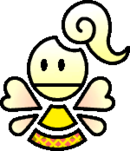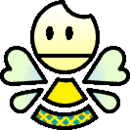Nimbi
| Nimbi | |||
|---|---|---|---|
 
Female (left) and male (right) Nimbis | |||
| First appearance | Super Paper Mario (2007) | ||
| |||
| |||
Nimbis are the angel-like citizens of The Overthere in Super Paper Mario. Their species name is a double entendre that comes from "nimbi" (plural for "nimbus"), referencing their physical appearance and habitat, and NIMBY, an acronym for "not in my backyard," referencing their behavior.
The Nimbis' speech is based on Elizabethan English, such as that used in the King James Bible. There are notable differences between actual Elizabethan English and the dialect the Nimbis speak. For example, the Nimbis seem to freely use "thou" (as a subject) and "thee" (as an object) in place of "you", but in Elizabeth English, "thou" and "thee" were strictly singular and informal/familiar, and were only used to address family members or friends, or people considered inferior by the speaker; rulers would take offense to being addressed with those pronouns. Furthermore, the suffix "-est" is used excessively. In proper Elizabethan era grammar, "-est" is the 2nd person singular familiar (therefore going with "thou") verb ending, which has no successor in Modern English, but can be likened to the "s" added in the 3rd person singular. Thus, "thou-knowest-what", as Fallbi says, is correct, but "tellest me, now, Mother," as Luvbi says, is incorrect, as a verb takes its base form when used to give a command; it would be like saying "Are there!" to mean "Be there!"
In terms of appearance, most of the Nimbis look identical to each other, except that females have hairstyles and warmer colors. Many of Nimbis' names are based on days, colors, seasons, or months.
Names in other languages
| Language | Name | Meaning | Notes |
|---|---|---|---|
| Japanese | エルエル人[?] Erueru Jin |
Possibly a partial repetition of「エンジェル」(enjeru, angel) +「人」(jin, people) | |
| French | Nimbi[?] | - | |
| German | Nimbi[?] | - | |
| Italian | Nimbì[?] | - | |
| Korean | 러브엘[citation needed] Reobeuel |
Transliteration of the Japanese name | |
| Spanish (NOE) | Nimbí[1] | - |